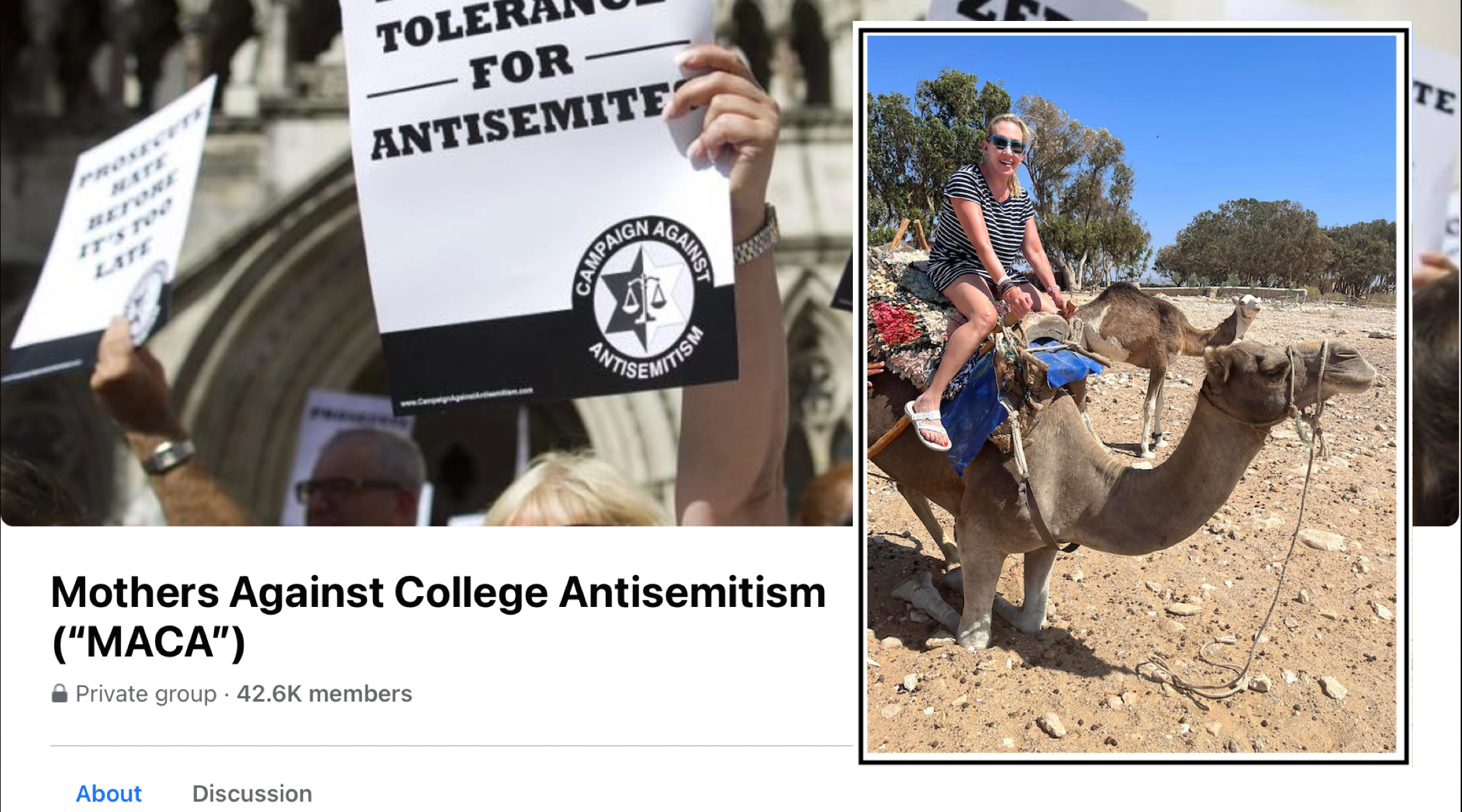(JTA) — As Elizabeth Rand watched an unnerving number of incidents pile up this month at colleges where her son was considering applying, she felt she had to do something.
The longtime administrator of a Facebook group for people interested in discussing the Holocaust, Rand knew the power of online community. So the New York City lawyer, who has a son in his senior year of high school, created a new Facebook group for mothers like her.
Within days after its Oct. 26 launch, Mothers Against College Antisemitism was exploding with posts from across the country expressing alarm about what was happening at colleges and universities in the wake of Hamas’ Oct. 7 attack on Israel and Israel’s ensuing war in Gaza.
Mothers exhorted each other to share reports from their children’s schools. They uploaded pictures taken by their children of activities and posters they found distressing. Some make pitches for their own children’s schools where, they say, nothing but support for Israel has been expressed. Several have offered to make their own homes available as safe havens for local Jewish college students who feel unsafe on their campuses.
By Friday, the group had more than 42,000 members, all pouring out their own anxieties at a time when even the White House has decried a surge in “grotesque” antisemitic incidents and has vowed to make a plan to curb them.
“I’m just stunned by this, and I have no idea what to do,” Rand told the Jewish Telegraphic Agency on Wednesday. “I’m getting these messages all day, every day. I have a day job — it’s not like I can just drop what I’m doing and do this.”
Rand has begun taking steps to turn the group’s members into a movement. She recruited a communications manager, appointed a team of administrators and moderators, and scheduled a meeting with members who possess legal and nonprofit know-how. For now, everyone involved is unpaid. Her goal, she said, is to form a legal entity, potentially to represent students who have been harmed by antisemitism on their campuses.
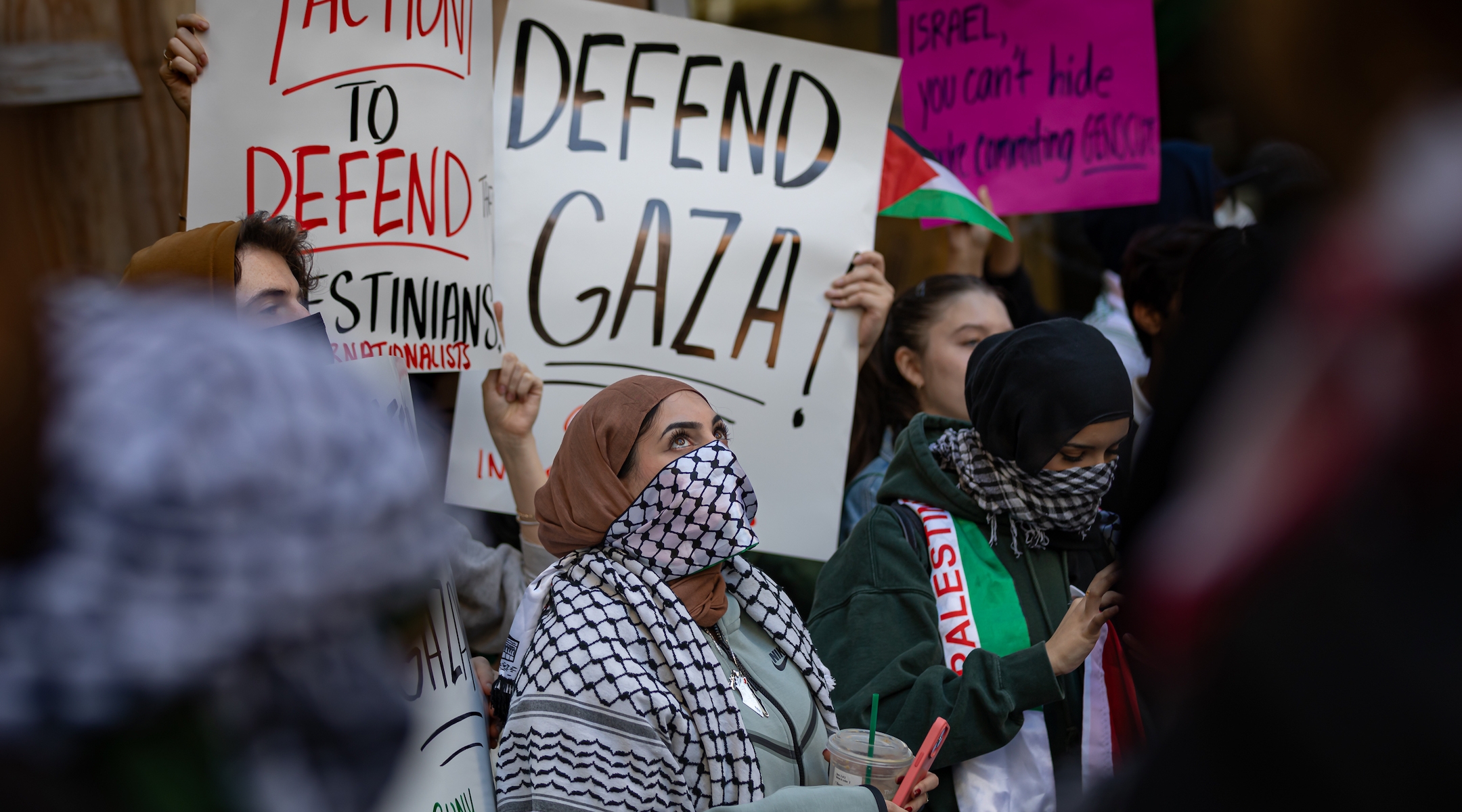
Students from Hunter College in New York City chant and hold up signs during a pro-Palestinian demonstration at the entrance of their campus on Oct. 12, 2023.(Michael Nigro/Pacific Press/LightRocket via Getty Images)
If Mothers Against College Antisemitism enters the legal sphere, it will have company. The Brandeis Center for Human Rights Under Law and the Lawfare Project each use litigation and federal complaints to pressure universities into responding more aggressively to antisemitism on their campuses. They have both announced their intention to sue over incidents that have taken place in the last month. Other pro-Israel advocacy groups have filed similar federal complaints.
“Do we join forces with a group that’s already doing it? Do we become sort of an add-on to them? I don’t know,” Rand said. “You know, I started this less than a week ago, so I don’t have all the answers.”
Multiple organizations already take responsibility for documenting and responding to antisemitism on college campuses. In addition to the legal advocacy groups, the Anti-Defamation League and Hillel International have partnered to catalog incidents, adopting a process that they say differentiates pro-Palestinian sentiment from anti-Zionist or antisemitic activity. On the ground, the Hillel chapters serving Jewish students on 850 campuses have been helping them cope with a challenging climate.
And Jewish on Campus, founded by a college student in the summer of 2020, harnesses student voices in the fight against campus antisemitism. That group bears certain similarities to Mothers Against College Antisemitism: It too was founded as a social media presence, was created to meet an anxious moment and did not enlist the backing or expertise of an established organization until later.
Julia Jassey, Jewish on Campus’ founder and CEO, said she understands the rapid emergence of Mothers Against College Antisemitism. She has seen the anxiety among parents even in her own family, as her younger sister applies to college this year.
“Parents are concerned for their kids, they’re concerned for their kids applying to college, they’re concerned for their kids in college,” she said. “People don’t know what to do. People want to help, and people feel helpless.”
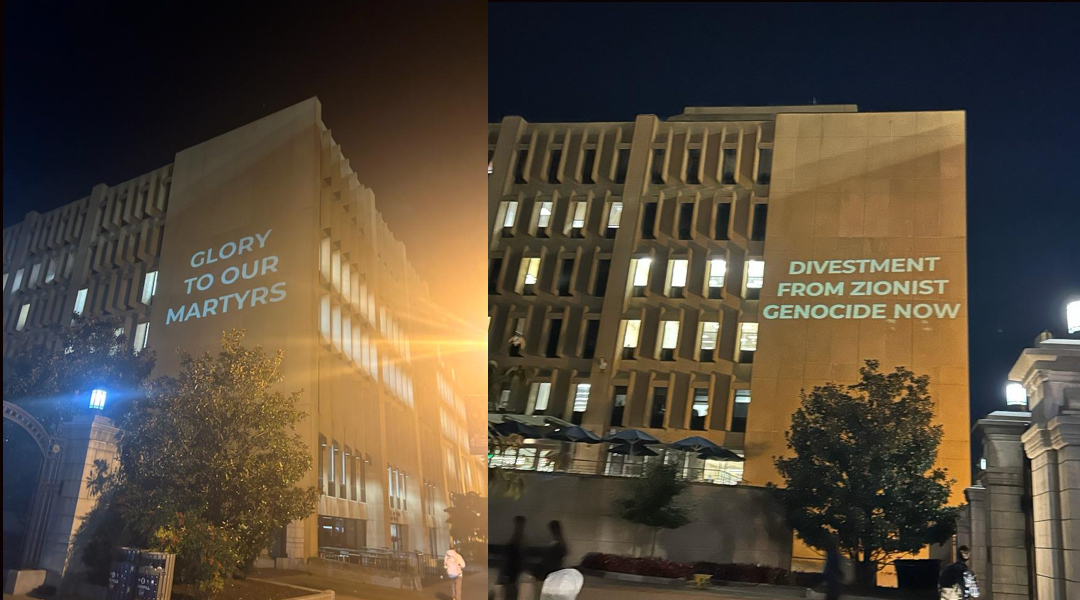
Messages reading “Glory To Our Martyrs” and “Divestment From Zionist Genocide Now” are projected onto the side of a building on George Washington University’s campus in Washington, D.C., Oct. 24, 2023. (StopAntisemitism via X)
But Jassey cautioned that Jewish students, not their parents, are best equipped to raise awareness about antisemitism on their campuses. She also emphasized that parents making long-term decisions for their children about college enrollment based on what’s happening on a campus right now, as some in the group say they are doing, might not be helpful.
“The last thing that I would ever tell a parent or a student is not to go to a certain school because it’s antisemitic. All that will do is self-select ourselves out of spaces where we want to be able to offer our experience and perspective,” Jassey said. “It’s really more important that when students go to school, they’re educated about what antisemitism is, how to combat it and what to do when they experience it.”
The arrival onto the scene of Mothers Against College Antisemitism offers a window into how significantly the current moment, in which campus incidents are radiating into public view at a relentless pace, may have activated a new wave of warriors against antisemitism. While some group members are already affiliated with Jewish groups active on antisemitism issues, many others say they had never realized that antisemitism could be a challenge their college-aged children would encounter.
Rand is one of them. She said that before Oct. 7, when Hamas attacked Israel and kicked off a war along with an international backlash against Israel, she had never been active in efforts to fight antisemitism — though as someone steeped in Holocaust conversations, she was well aware of its potential consequences.
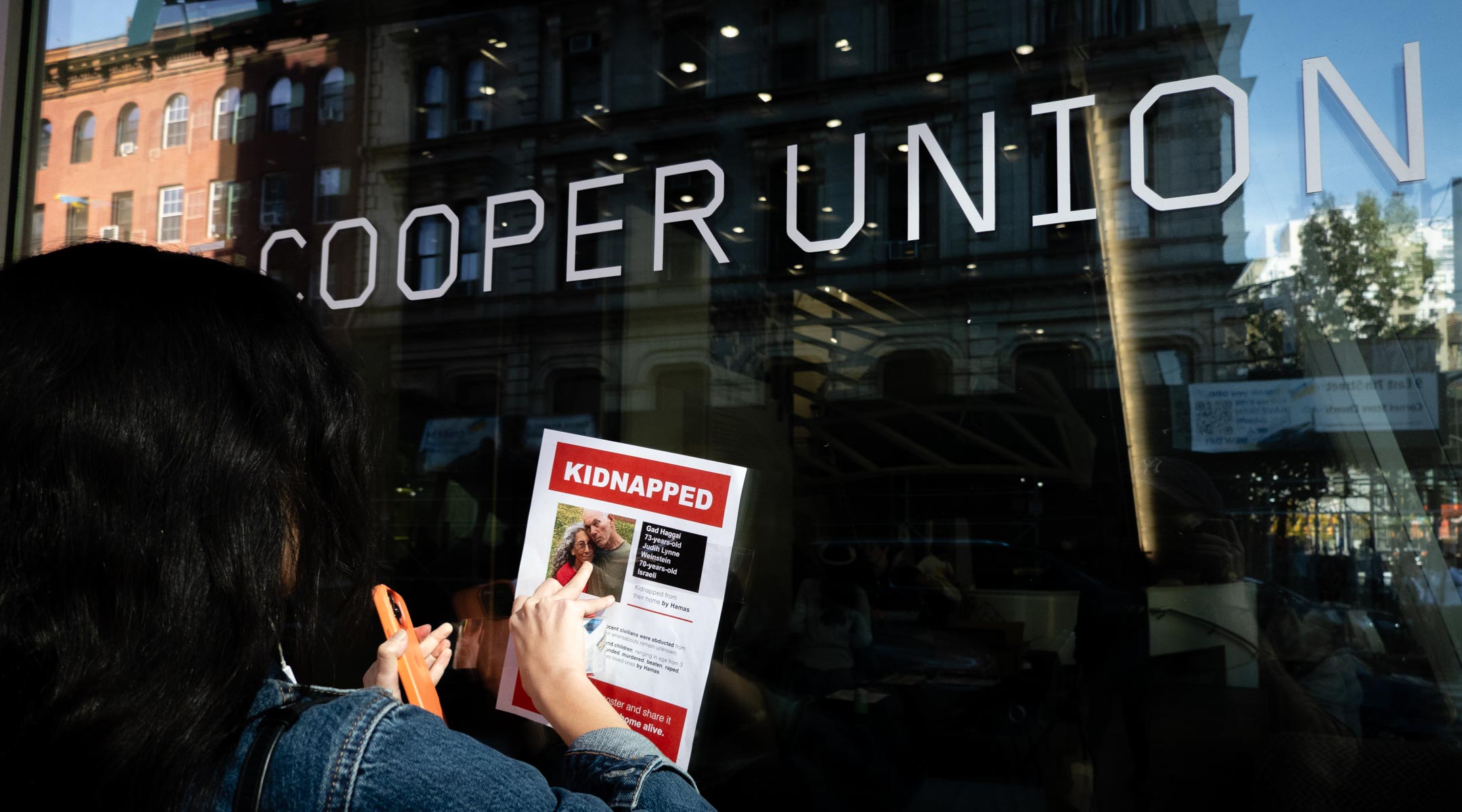
A woman affixes a flier for Israeli hostages at Cooper Union college in New York City, a day after Jewish students there sheltered in a library during a pro-Palestinian protest, Oct. 26, 2023. (Luke Tress)
She said it was the pro-Palestinian messages projected onto the wall of a library at George Washington University, which included “Glory to the Martyrs,” that convinced her she had to do something. The pictures of student protesters carrying signs showing Israeli flags in trash cans that have pushed her to keep going.
“It just seems very simple that you don’t want your child going to a school and seeing the imagery of a Star of David in a garbage can,” Rand said. “And you certainly don’t want to pay for that. You don’t want to give somebody $60- or $80,000 a year and see that. It’s absolutely outrageous.”
For Rand, the whole experience has been dizzying and she says she’s “sort of been making this up as I go along.” She said she takes inspiration from Mothers Against Drunk Driving, formed in 1980 by a mother whose daughter was seriously injured by a drunk driver. (She would later die from her injuries.) The group was instrumental in getting the drinking age in the United States lifted from 18 to 21, and drunk driving deaths fell sharply in the wake of its activism.
“They were just a group of ordinary mothers and they really changed the world,” Rand said. “In addition to changing federal law, they made it completely and totally socially unacceptable to drink and drive. I’m old enough to remember when that was not the case. So I want to make it socially unacceptable to display Jew hatred on college campuses.”
Posts in the group offer a view into how members aim to press for action. Some are posting pictures of their responses to alumni donation requests where they say they won’t give to a school they see as supporting antisemitism — a lower-budget version of the boycotts some prominent donors have announced. Others are exhorting fellow group members to sign petitions and open letters to demand that colleges condemn Hamas and provide additional security for Jewish students. An inchoate effort is underway to create an antisemitism rating system for colleges based on what gets reported inside the group.
Debates among the group members also underscore how quickly longstanding fault lines are being recreated, particularly on the issue of whether peaceful pro-Palestinian demonstrations or vocal criticism of Israel should be tolerated.
One illustrative exchange came on Thursday night. “Princeton had a huge rally calling for an intifada. Who can I contact?” one member wrote. Another answered: “Princeton also had a ProHamas teach-in. But from insiders on campus I’m being told students feel safe and cared for. Did something else happen?”
Emma Law-Oppman, an Indiana mother who trained as an attorney, is one of four administrators hand-picked by Rand to monitor and manage the flurry of activity.
Unlike Rand, Law-Oppman is a member of a synagogue and active in Jewish organizations, including the Indianapolis Jewish community relations council and the Hillel at her alma mater, Butler University. She said had long believed that antisemitism on college campuses was a problem, so she rushed to join the group even though her only child is just 4 years old.
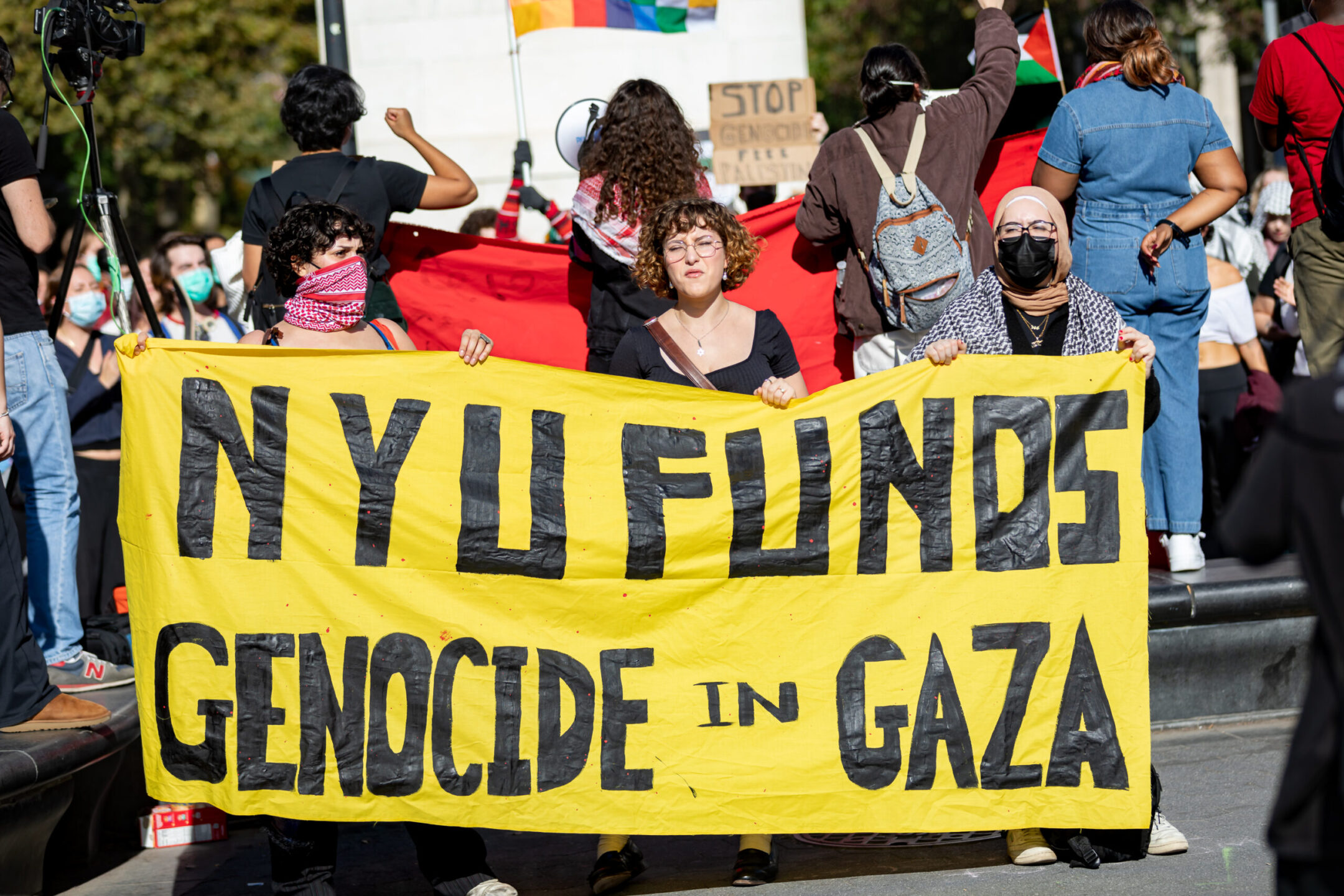
Students from New York University hold an “NYU Funds Genocide in Gaza” sign while protesting the Israel-Hamas war during a rally as students call for a ceasefire in Gaza, on a day of student walkouts across the country. (Michael Nigro/Pacific Press/LightRocket via Getty Images)
“They will also be my son’s teachers. They’re building the world that my son is going to live in,” she said about students she has seen on social media calling for the destruction of Israel or rejecting criticism of Hamas. “And that scares me, frankly.”
The administrators have been hammering out rules for the group and trying to harness its energy, each day suggesting a specific action for members to take, such as signing an ADL petition and texting their representatives to support a congressional condemnation of campus antisemitism that passed on Wednesday night. “If 40,000 people call a state governor, or 40,000 people call a school administration, or 40,000 people read an email, or 40,000 people do anything, that’s hard to ignore,” Rand said.
The moderators have also been trying to root out posts that they believe would inappropriately divide group members. “The big thing right now is we’re focused on concrete, positive social action,” Law-Oppman said. “We’ve made it very clear that you don’t tolerate any hatred, bigotry or political infighting. Our sole focus is protecting and supporting our collective children from hatred and ignorance and violence.”
In addition to organizing parents, Law-Oppman said she thought Mothers Against College Antisemitism could be a useful complement to the activism that students are already engaged in.
“Kids in college are kind of figuring out their relationship with their parents as adults and where they fit into their adulthood, and sometimes that means that parents aren’t getting information from their kids directly,” she said. “So if this provides a space where parents can know what’s happening on campus without helicoptering that’s also a gift to parents.”

From left to right, Jewish students Eli Shmidman, Noa Fay, Yoni Kurtz and Jessie Brenner speak at a press conference at Columbia University in New York City, Oct. 30, 2023. (Courtesy)
Law-Oppman said she thought the group could ultimately end up connecting students with legal counsel, including through existing groups, or to be a resource for families trying to figure out how to respond with antisemitism at their children’s schools. But she said it’s already fulfilling an essential purpose.
“It’s a place for parents specifically to come and seek the emotional support and community that I think we all need right now,” she said. “I think how quickly it grew is a testament to that fact, right? We’re all seeking that community.”
To keep that community cohesive, Rand is determined that the group not pick a side in longstanding fights over whether antisemitism is a bigger problem on the right or the left, even as she sees them spill over into the posts.
“There’s a lot of politics and I kind of wish it would stop,” she said. “I don’t really want to be political at all. I’m pretty middle of the road. … I don’t really want to go there. I want us to just stay focused on what’s important, which to me is just keeping your kids safe.”
Rand is aware that her group’s acronym bears an unmistakable resemblance to that of another movement that is decidedly political, including about Israel. “It’s been brought up time and again that people here feel the group acronym MACA bears too much resemblance to MAGA,” she wrote in a post late Thursday night.
But she said her group’s name had already caught on – and she hoped it would outlast the current political moment. “Twenty years from now there will be students who have never heard of MAGA,” she wrote. “But with any luck, they’ll hear about us and know that we are there for them always.”
JTA has documented Jewish history in real-time for over a century. Keep our journalism strong by joining us in supporting independent, award-winning reporting.
